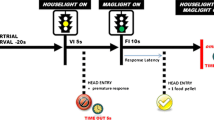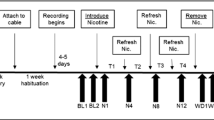Abstract
The objective of this series of studies was to examine the relationship between alcohol sensitivity and the development of very rapid acute tolerance to alcohol in mice. In order to measure acute tolerance to alcohol, a behavioral test was developed using a rotorod. In the first study, mice selectively bred for resistance (short sleep, SS) or sensitivity (long sleep, LS) to the acute hypnotic effects of ethanol were used, as well as mice from the base population (heterogenous stock, HS). Mice were trained to run on the rotorod at a speed of 14 rpm to a criterion of 200 s, in four daily training sessions. On the test day, baseline measurements of rotorod performance were taken and mice were injected IP with alcohol in doses from 0 to 2.5 g/kg. Animals were tested at 1-min intervals for the first 5 min following injection, then at 5-min intervals for a total of 30 min. The results demonstrated that SS and HS mice developed tolerance within 10 min following the alcohol injections. LS mice did develop some acute tolerance, but at a much slower rate than the SS or HS mice. In the second study, the effects of intoxicated practice on the rates of acute tolerance development were examined in the SS, HS and LS mice at a dose of 2.0 g/kg alcohol. A total of ten groups of each strain were given a different number of practice trials (ranging from one to ten) on the rotorod prior to a final test session at 30 min post-injection. The results provide evidence that SS and HS mice are capable of developing acute tolerance independent of practice. That is, the group of animals injected at 0 time and tested ten times up to 30 min were no better at the 30-min time point than the group injected at 0 time and tested only once at 30 min. On the other hand, the LS mice showed a modest practice effect, developing additional tolerance to the ataxic effects of alcohol with increasing intoxicated practice. Overall, these studies demonstrated that mice can develop acute tolerance within minutes following alcohol exposure, and that this ability is correlated with the initial sensitivity to alcohol.
Similar content being viewed by others
Author information
Authors and Affiliations
Additional information
Received: 12 July 1997 / Final version: 26 August 1997
Rights and permissions
About this article
Cite this article
Gill, K., Deitrich, R. Acute tolerance to the ataxic effects of ethanol in short-sleep (SS) and long-sleep (LS) mice. Psychopharmacology 136, 91–98 (1998). https://doi.org/10.1007/s002130050543
Issue Date:
DOI: https://doi.org/10.1007/s002130050543




